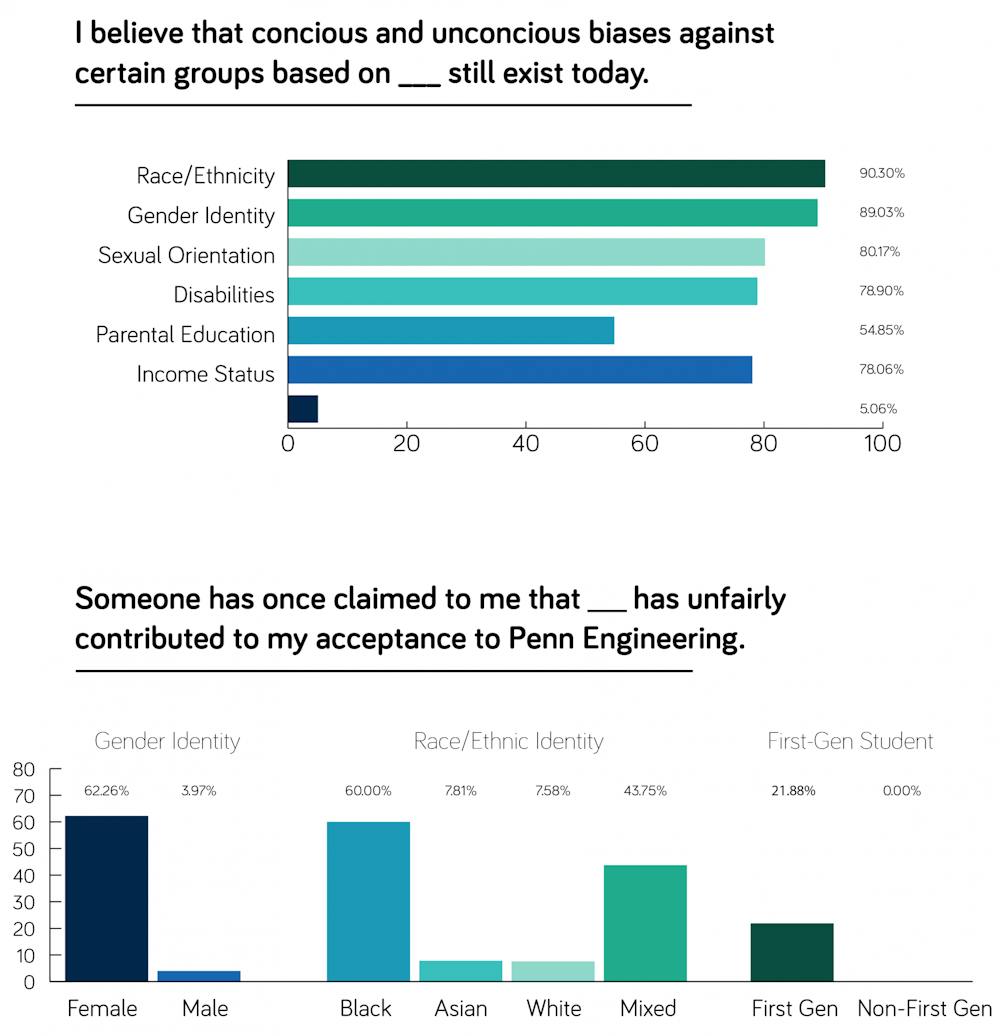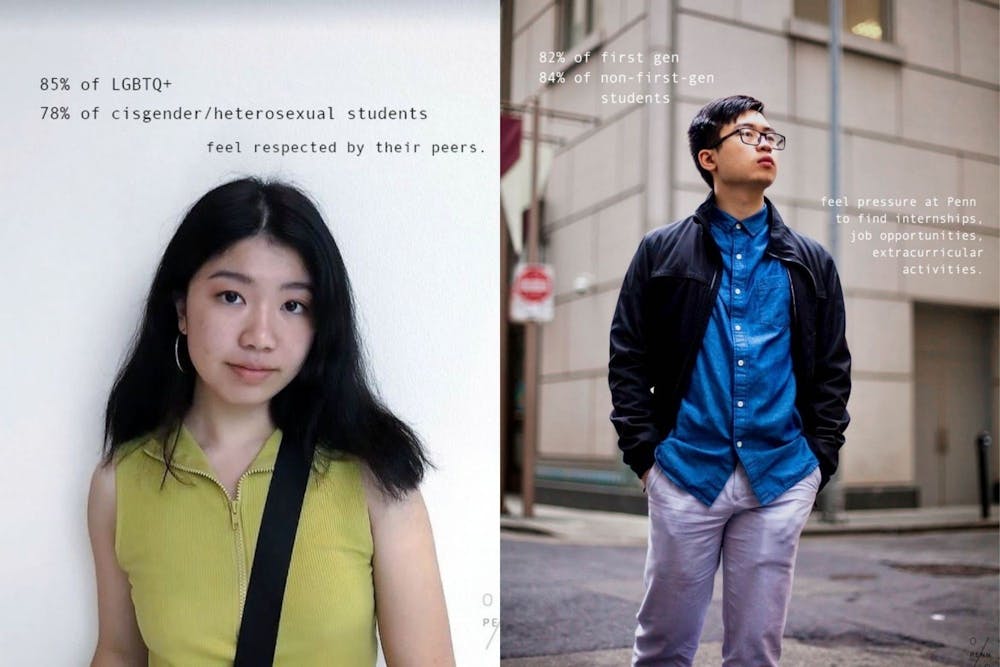
The Percentage Project, a Penn-founded advocacy campaign-turned-nonprofit, found that many students in the Computer Science department, namely female students and students from underrepresented racial backgrounds, have faced discrimination and discomfort while at the University.
First launched on campus in 2018, the Percentage Project aims to "put a face to a number" by visually portraying statistics alongside pictures of students studying computer science. The project encourages reflection upon the instances of microaggressions and discrimination faced by marginalized groups in the computer science field.
This year's edition of the project is set to be released on March 31, and will display statistics from a census that anonymously surveyed members of the University's computer science community. The survey, which received about 300 responses, is primarily conducted by the Penn Women in Computer Science student organization in coordination with the CIS department.
While the project was originally founded at Penn, the nonprofit debuted as an independent entity at other universities around the country in 2019. Eleven schools are now involved in the project, including peer institutions such as Brown University, Duke University, Harvard University, and Vanderbilt University.
Questions asked in the survey to Penn students in the CIS department include whether students feel comfortable asking questions during lectures, if they feel intimidated studying computer science, and if anyone has ever told them that they had an unfair advantage attaining job opportunities due to their background.
According to a 2016 Google report published about national diversity gaps in the computer science field, Black students are less likely than white students to take classes in computer science at their college, at 47% to 58%, respectively. Additionally, male students are statistically more likely to be told by a professor, parent, or guardian that they would be good at computer science when compared to their female counterparts.
Many respondents reported discrimination based on their gender, as well as racial and ethnic identities.
According to the survey, 62.26% of female respondents reported that someone once told them that their gender identity unfairly contributed to their acceptance to Penn's School of Engineering and Applied Science, as opposed to just 3.97% of male respondents.
The survey also found that 72.64% of female respondents would be unlikely to post on Piazza, a virtual platform in which students can ask questions of their instructors, if the platform did not allow for anonymous questions, as opposed to 49.21% of their male counterparts.
Sixty percent of survey respondents who identified as African American or Black reported that someone once claimed their racial identity unfairly contributed to their acceptance to the Engineering School, in comparison to 7.81% of Asian and 7.58% of white respondents.
The vast majority of respondents also said they believe unconscious biases against certain groups based on race and ethnicity, gender identity, sexual orientation, and disability still exist today.
In general, according to the survey, 82.28% of student respondents say they feel respected by their peers at Penn, and 77.64% feel respected by their professors and teaching assistants.

Lucia Huo, a 2020 Engineering graduate and the nonprofit’s outreach director who founded the project during her sophomore year at Penn with 2019 Engineering graduate Stephanie Tang, said that the pair originally came up with the idea when considering ways to share data that would “make people pay attention.”
“We centered the project off of this idea of bringing people's faces into it, so we had photoshoots [of the survey respondents] and then attached the data collected to the photos so that people would really be able to get a sense of the types of people who are experiencing the phenomena that we were highlighting,” Huo said.

Campus leaders of the project believe that the awareness of identity-based disparities in the computer science field is critical for students to be conscious of before beginning their careers.
Engineering first year Christa Simaan, one of the project's two campus directors, said her involvement in the movement has given her an increased cognizance of diversity in the STEM field, which she said has already had a significant impact on her experience at Penn.
“As a CIS student, and also being on the Women in Computer Science advocacy team and part of the Percentage Project, I am constantly surrounded by an amazing group of people,” Simaan said. “Having this cohort surrounding me, and then also working to achieve a student body that’s more aware of the diversity census, truly makes Penn feel like more of a warm, welcoming environment for me.”
2019 Engineering graduate Jake Bass, who initially got involved with the project during his junior year at Penn, said that as a first-generation college student, he was passionate about advocating for underrepresented communities. Bass added that he feels it is necessary for today’s engineers to endeavor to create more inclusive working environments, which he said the project aims to accomplish.
In the survey, 21.88% of respondents identifying as first-generation students said that someone has once claimed that being a first-generation student unfairly contributed to their admission to the Engineering School.
“Not only did I have to adjust to the culture shock [upon coming to Penn], but I realized that some of my peers clearly had more resources at their disposal to be successful,” Bass said. “I was excited to get involved in an opportunity like the Percentage Project to help create more resources for students who felt like they were on an uneven playing field.”
Survey respondents felt similarly to Bass' sentiments about the pressure to succeed in their careers, with 90.72% saying they felt pressure to find internships and job opportunities in the computer science field.
Engineering senior Carly Ryan, one of the project's campus directors, said that she got involved with the project because she believes that Penn students who are going into engineering are able to incite change to make the field more inclusive.
“The Percentage Project paints a community better than just with graphics, charts, and graphs,” Ryan said. "It goes to show that [each survey respondent] is a piece of our larger community, not just some number or a percent in a statistic.”
The Daily Pennsylvanian is an independent, student-run newspaper. Please consider making a donation to support the coverage that shapes the University. Your generosity ensures a future of strong journalism at Penn.
Donate





